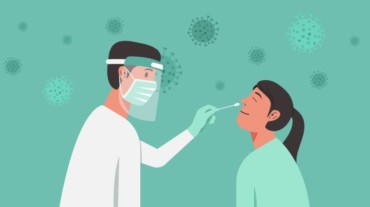
Getting tested for coronavirus might make you feel nervous but it’s absolutely necessary as well. Usually, nasal/throat swab or a blood test is used to detect the presence of the virus. With an increased understanding of the novel virus, diagnostic technology has also improved and the latest news suggests that a simple saliva test can be used for diagnosis.
Researchers at Memorial Sloan Kettering Cancer Center (MSK) have found that SARS-CoV-2 genetic material can be reliably detected using self-collected saliva samples at a rate similar to that of nasopharyngeal and oropharyngeal swabs.
The rate of detection using saliva samples was similar across different testing platforms, and saliva samples remained stable for up to 24 hours when stored with ice packs or at room temperature, according to a new study in the Journal of Molecular Diagnostics, published by Elsevier.
Oral rinses, which have been suggested as another alternative to nasal swab collection, failed to reliably diagnose COVID-19.
“The current pandemic has placed a significant strain on the supply chain, from swabs to the personal protective equipment (PPE) healthcare workers need to safely collect samples,” said lead investigator Esther Babady, PhD, D(ABMM), FIDSA, director of the Clinical Microbiology Service at Memorial Sloan Kettering Cancer Center, New York, NY, USA.

“The use of self-collected saliva has the potential to minimize healthcare worker exposure and decrease the need for specialised collection devices, such as swabs and viral transport media,” added Babady.
The study was conducted at MSK in New York City during the peak of the regional outbreak between April 4 and May 11, 2020. Study participants were 285 MSK employees who needed to be tested for COVID-19 because they had symptoms of the virus, or had been exposed to someone who had the virus.
Each participant provided paired samples: a nasopharyngeal swab and oral rinse; a nasopharyngeal swab and a saliva sample; or an oropharyngeal swab and a saliva sample. All samples to be tested were stored at room temperature and transported to the laboratory within two hours.
The agreement between the saliva test and the oropharyngeal swab was 93 per cent, with a sensitivity of 96.7 per cent. In comparison with the nasopharyngeal swab, the agreement of the saliva test was 97.7 per cent, with a sensitivity of 94.1 per cent.
Oral rinses were only 63 per cent effective in detecting the virus, with an overall agreement with a nasopharyngeal swab of only 85.7 per cent. To test for stability, saliva samples and nasopharyngeal samples with a range of viral loads were stored in a transport cooler at 4° C, or at room temperature.
Select Topics of your interest and let us customize your feed.
PERSONALISE NOWNo significant difference in virus concentration was detected in any samples at the time of collection, eight hours later, and twenty-four hours later. These results were validated on two commercial SARS-CoV-2 PCR platforms, and overall agreement between the different testing platforms was over 90 per cent.
Dr Babady noted that validation of sample self-collection methods holds great promise for broad testing strategies that would mitigate infection risk and PPE resource utilization.
Also, watch:
“The current ‘test, track, and trace’ public health approach to surveillance relies heavily on testing for both diagnosis and surveillance. The use of self-collected saliva provides a cheaper and less invasive option for viable sample collection. It’s certainly easier to spit in a cup twice a week than undergoing frequent nasopharyngeal swabs,” she stated.
“This can improve patient compliance and satisfaction, particularly for surveillance testing which requires frequent sample collection. Since we also showed that the virus was stable at room temperature for at least 24 hours, saliva collection has potential for use at home,” she added.
(With inputs from ANI)
Get Latest Updates on Health News